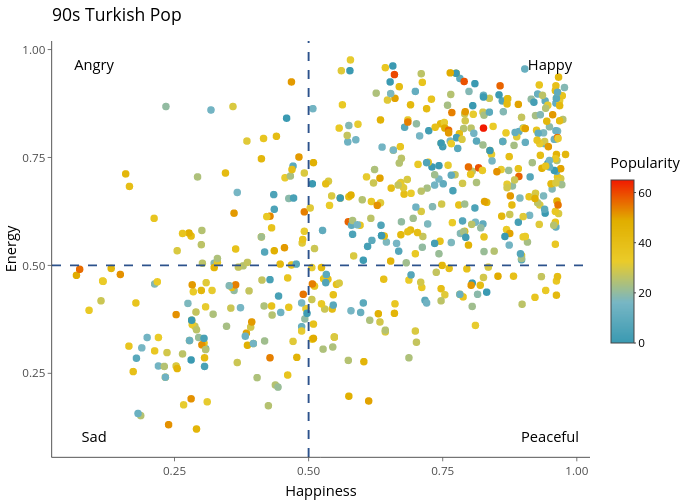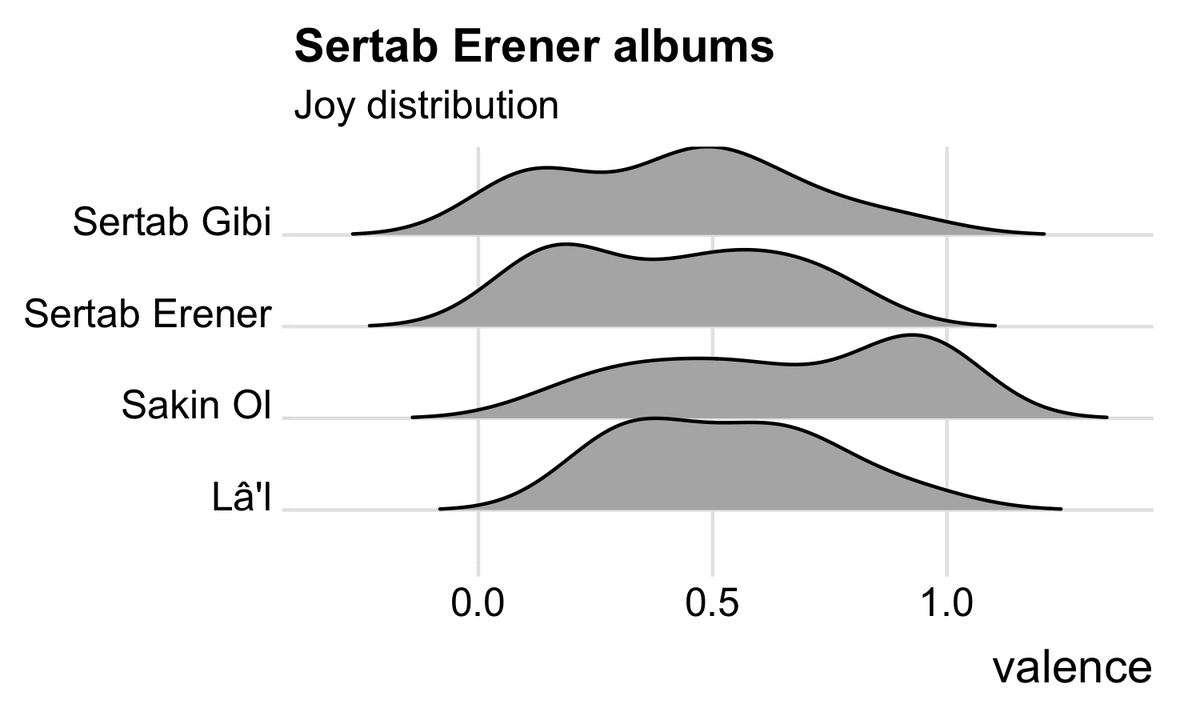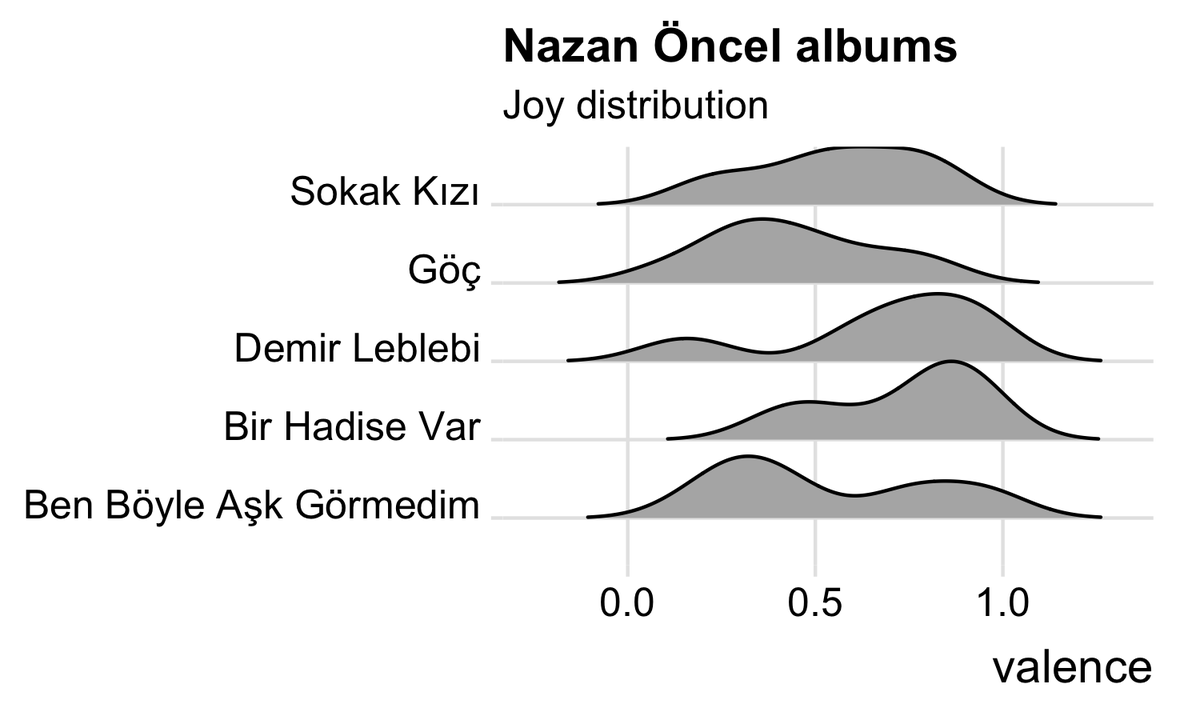We all love 90s Turkish pop songs. However, we don't know much about these masterpieces beyond qualitative discussion&personal memories.
Using Spotify's Public API, I analyze 90s Turkish Pop with data! (1/n) https://www.aslicansunar.com/turkishpop
Using Spotify's Public API, I analyze 90s Turkish Pop with data! (1/n) https://www.aslicansunar.com/turkishpop
Spotify’s Public API lets you call data on artist, album, or playlist and gives info on the mood&popularity of songs. One metric is valence-“a measure ranging from 0 to 1 describing the musical positiveness of a track.High valence->more positive, low valence->more negative.(2/n)
Similarly, Spotify reports energy, “a measure that ranges from 0 to 1 and represents a perceptual measure of intensity and activity. Closer to 0-> less energetic, closer to 1 -> more energetic. (3/n)
Using these two metrics,I place 557 90s Turkish pop songs on a graph. Depending on the combination of a song’s valence&energy metrics, I place each song in one of the following categories: angry, happy, sad, and peaceful.(4/n)
Interactive chart at https://www.aslicansunar.com/turkishpop
Interactive chart at https://www.aslicansunar.com/turkishpop
Let us take a closer look at the graph. It shows that the saddest two songs of the 90s are “Yoksun Sen” by Asya and “Elveda” by Askin Nur Yengi. I think this is spot-on, these songs can make anyone cry for no good reason. (5/n)
Let us cheer up! Looking at the upper-right corner, our graph shows that the happiest three songs of the 90s are “Cukulata Kiz” by Ragga Oktay, “Yeniden Sev” by Nilufer, and “Koylu Guzeli” by Hakan Peker. (6/n)
I am not sure about Yeniden Sev; it is joyful-but it seems like a stretch to classify it as one of the happiest.Lyrics might be affecting my perception though; remember, Spotify classifies songs based on music - not lyrics. (7/n)
What about the most angry song? “Zehir Ettin” by Deniz Arcak. Home run! (8/n)
What else can we do with Spotify’s Public API? Let us analyze the density plots of sad songs in the albums of three Turkish pop music queens: Sezen Aksu, Sertab Erener, and Nazan Oncel! Below, you can see the valence density of songs in five 90s Sezen Aksu albums. (9/n)
(What is a density plot - how do we make sense of these graphs? The density plot shows the smoothed distribution of the songs' valence in each album. The peaks of the density plot are at the locations where there is the highest concentration of points.) (10/n)
The saddest album of Sezen Aksu in the 90s is "Deli Kizin Turkusu." No surprises here. "Dugun and Cenaze" songs are also predominantly sad. "Gulumse" seems to have a wide range of songs with different moods. (11/n)
Let us look at Sertab Erener's albums. Sakin Ol is the happiest - and again, no surprises. Compare Lal and Sakin ol on the graphs, and now think about all the songs in these two albums. Certainly, Lal is much sadder than Sakin Ol!(12/n)
I thought the biggest surprise was with Nazan Oncel albums. Demir Leblebi seems to be the album with the “happiest” songs. Isn’t this weird — “Demir Leblebi” is known to be the harshest Nazan Oncel album? (13/n)
Once again, we see how lyrics can overwrite the sadness/happiness of the melody. If you start listening to “Demir Leblebi” without paying attention to lyrics, you will see that the songs' melodies are not very sad.(14/n)
One last question to answer with data: why do we love the 90s so much? Do we listen to these songs to cry or to dance? Based on the valence metric, I group each piece into one of the following five categories: very sad, sad, neutral, happy, very happy. (15/n)
I then look at the density plot of each category’s popularity in Spotify. It seems that there are no very significant differences in popularity among categories. It means that we love to cry while listening to these songs as much as we love to dance to them. (15/n)
More data&plots&charts will follow. What would you like to me to analyze? I am very open to suggestions! (16/n)
This analysis was very much influenced by @yineyeni90lar's great discussion of 90s Turkish pop!
This analysis was very much influenced by @yineyeni90lar's great discussion of 90s Turkish pop!

 Read on Twitter
Read on Twitter





